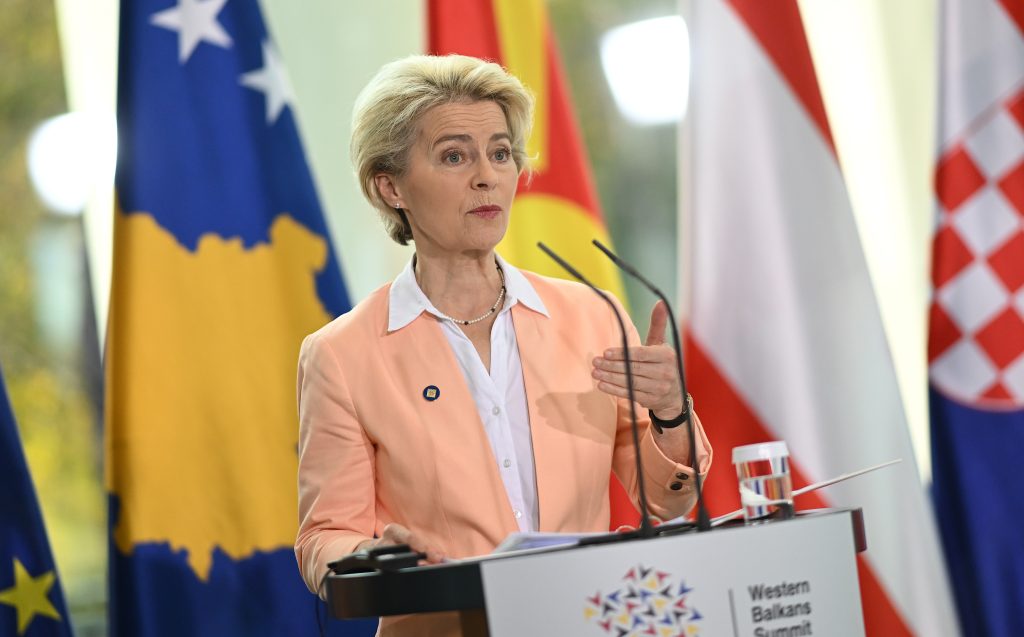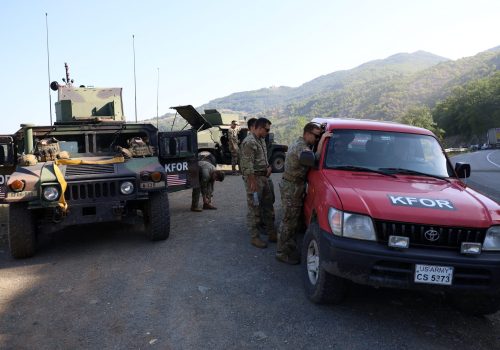Russia’s brutal invasion of Ukraine has served as a wake-up call for the European Union (EU) and added urgency to the discussion of EU enlargement. Russia’s war has highlighted the need to fast-track the accession process for Ukraine and Moldova, and to revitalize it for the Western Balkans countries not yet in the EU: Albania, Bosnia and Herzegovina, Kosovo, Montenegro, North Macedonia, and Serbia. Earlier this month, EU foreign policy chief Josep Borrell even welcomed a 2030 deadline for the next enlargement, hoping that this will mobilize energies both in the EU and in candidate states. The question now is how to get candidate countries ready to join the bloc.
What would help the Western Balkans most is an EU-driven economic growth plan. A small market of six countries with fewer than eighteen million consumers and a total gross domestic product (GDP) of $144 billion, or less than 1 percent of the EU’s GDP, the Western Balkans could easily be embraced in the EU single market. At the same time, the region still lags behind the rest of Europe, with an average per capita income of just $7,650, only 14 percent of the EU average ($54,100), according to International Monetary Fund data. Convergence with the EU has been slow over the last twenty years.
In part to narrow this gap, EU Commission President Ursula Von der Leyen proposed a four-pillar growth plan for the Western Balkans in May. The plan’s aims include bringing the region closer to the EU single market, deepening regional economic integration, accelerating fundamental reforms, and increasing pre-accession funds. With the Western Balkans representing Europe’s soft underbelly and talk about EU expansion returning, now is the time for focused attention on advancing the goals of this plan and accelerating the region’s EU accession.
Access to the EU single market
The EU is the Western Balkans’ main trading partner, accounting for more than two-thirds of the region’s total trade. All Western Balkan countries enjoy access to the internal market for goods through the Stabilization and Association Agreements, but they are not deep enough, even compared to the Deep and Comprehensive Free Trade Agreements the EU has with Ukraine, Georgia, and Moldova.
The EU should work to deepen its integration with the region ahead of full EU accession. To do so, it should gradually phase these countries into all economic sectors by granting them full access to the single market and its four freedoms (goods, people, services, and capital). This would foster convergence and build institutional capacity, and it would give the EU better leverage in ensuring compliance with rule-of-law reforms. This would be similar to the EU’s economic relationship with Norway and Iceland, where the European Economic Area extends the laws of the single market to both countries (with the exception of agriculture and fisheries). While the agreement with Norway and Iceland is intended to be an end in itself, for Western Balkans countries it could instead be a gradual deepening toward full EU membership.
Since March 2022, Ukraine has enjoyed the four freedoms through the Temporary Protections Directive, further proving that this level of market access for non-EU states is feasible. The benefits for Western Balkans countries of increasing participation in the single market are clear. Croatia’s GDP, for example, has increased by 75 percent (from $59 billion to $79 billion) since it joined the EU in 2013, translating into higher incomes for its citizens, with an average increase in per capita GDP of 67 percent (from $13,900 in 2013 to $20,537).
Financial support is key to reducing the economic and infrastructure gaps between EU members and the Western Balkans. The EU has been the largest provider of financial and development assistance in the Western Balkans, supporting reforms with financial and technical assistance via the Instrument for Pre-accession Assistance (IPA), which allocated 12.8 billion euros between 2014 and 2020. But the commitment for the IPA under the current EU long-term budget is 14 billion euros, less than 1 percent of the total long-term budget and Next Generation EU funds for 2021-2027 (2.02 trillion euros).
Given the importance of the Western Balkans, EU financial support to the region should be increased to speed up its countries’ socioeconomic convergence with the bloc and increase socialization with EU rules and its organizational culture. This will help smooth the way for the countries to join the single market.
Western Balkans ‘nearshoring’
Becoming part of the EU single market is not just about trade—it’s about investment, economic modernization, democratic progress, rule of law, and better regional cooperation. In recent years, several initiatives have been adopted to foster regional economic integration, including the Common Regional Market Action Plan 2021-2024. These initiatives aim at building a common regional market based on EU rules and regulations and on the four freedoms. They are intended to be a stepping stone for Western Balkan economies to better integrate into European value chains and improve their competitiveness. The initiatives have focused on four main regional areas: trade, investment, digitalization, and industry and innovation. The establishment of “green lanes”—streamlined border crossings for freight vehicles—during the COVID-19 pandemic was a successful example of regional cooperation.
The Berlin Process, a very important initiative that has pushed for faster economic integration with the EU, has also been revitalized, and the next meeting will be held in Albania in October. The Open Balkans Initiative, another project that started as an economic cooperation agreement among Serbia, North Macedonia, and Albania in 2021, has also offered some practical steps for better economic cooperation in the region.
Regional economic integration is imperative for the Western Balkans to benefit from bigger markets and greater competition by fostering cross-border production chains and leveraging regional comparative advantages. To attract the interest of serious foreign investors, it is necessary to cooperate in a “pooled” competition for foreign direct investment. This will help countries to improve their competitiveness by incentivizing technological and industrial clusters, as well as help modernize their economies, facilitate innovation, and improve skills and productivity.
As European companies are looking to relocate their supply chains closer to home, investing in the Western Balkans for the production of critical goods would contribute to the EU’s strategic economic autonomy, following through on the “de-risking” goals that occupy a key place in the EU’s newly published European Economic Security Strategy.
Developing European industrial clusters in the Western Balkans would increase EU’s competitiveness, including in key areas such as green and solar industries, biotech, and electric vehicles. Ports in the Adriatic Sea are important for the resilience of trade routes and hold potential for investment in liquefied natural gas transportation as well.
Lower labor costs in the Western Balkans and strategic connectivity in terms of energy and transport make the region attractive, but what is needed is more EU investment to improve infrastructural networks. EU investment in strategic infrastructure projects in the Western Balkans to boost interconnectedness would also counter China’s increased economic and diplomatic footprint in the Western Balkans. This growing footprint challenges European business interests and fuels practices that hinder the EU’s to enhance promotion of Western norms and standards.
A two-way street for investment and reforms
To meet the 2030 aspiration timeline for enlargement, the EU should redouble its efforts now to help prepare the countries of the Western Balkans for accession. Increased European investment in the Western Balkans is needed to foster the creation of industrial clusters, while also promoting better economic standards and accelerating important economic reforms.
But this must not be a one-way undertaking in which the EU steps up but the status quo deficiencies in the region go unchallenged. Governments in the Western Balkans should be prepared to offer a serious platform for relocation of EU investment from China and other countries in Asia to the region. A friendly business environment based on EU standards, the rule of law, transparency, and regional integration are the baseline conditions to attract serious investment.
A focus on rule of law and fundamentals also needs to be at the core of the EU enlargement process. Von der Leyen announced this month in her State of the European Union speech that the EU will introduce rule-of-law reports for candidate countries. This is a welcome step. Without a commitment and a high degree of accountability on the part of the elected leaders in the Western Balkans, any investment of resources, time, and attention by the EU will only result in marginal returns.
It is the right moment for a shift in the enlargement mentality, and it is in the interest of the EU to consider the Western Balkans as an integral part of European solutions to global challenges.
Valbona Zeneli is a nonresident senior fellow at the Atlantic Council’s Europe Center and at the Transatlantic Security Initiative of the Atlantic Council’s Scowcroft Center for Strategy and Security.
Further reading
Fri, Jun 30, 2023
The next European Union member is…
New Atlanticist By
Ten years after Croatia joined the bloc—the last country to do so—Atlantic Council experts look at eleven countries that might join next.
Thu, Sep 14, 2023
Reading between the lines of Ursula von der Leyen’s ambitious vision for the EU
New Atlanticist By
The European Commission president delivered her annual speech on the state of the European Union on September 13 in Strasbourg.
Fri, Aug 19, 2022
The Western Balkans need a problem-solver, not a facilitator
New Atlanticist By Damir Marusic, Luka Ignac
The West must pursue ambitious statesmanship to break the impasse between Kosovo and Serbia, as Russia's war in Ukraine has shifted regional dynamics.
Image: EU Commission President Ursula von der Leyen speaks at a press conference after the Western Balkans Summit. The heads of state and government of the six countries of the Western Balkans that aspire to join the EU took part.



